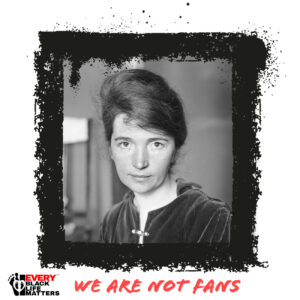The Shadow of Eugenics: Margaret Sanger's Impact on the Black Community
Written by Contributing Author, Charles Wekesa

By Charles Wekesa
While her advocacy for women’s reproductive rights may have stemmed from good intentions, Sanger’s embrace of eugenics and racist views cast a long shadow. Her actions highlight the importance of critically examining historical figures, acknowledging both their contributions and the damage caused by their harmful beliefs. We must remember that progress in healthcare cannot come at the expense of marginalized communities. As we navigate Sanger’s complex legacy, we must condemn the racist underpinnings of her work, ensuring that the fight for reproductive rights benefit all communities equally.
The Shadow of Eugenics: Margaret Sanger’s Impact on the Black Community
Written by Charles Wekesa
Our use of “reproductive rights” in this article is simply meant as true access to healthcare for women regarding OBGYN. We are NOT using it as the trojan horse term it has become today.
Margaret Sanger, is a controversial figure in American history who initiated Planned Parenthood in 1916. She started the organization as a single solitary birth control clinic in New York City which turned out to be the largest promoter and advocate of abortion in America. Planned Parenthood in the recent past has attempted to dissociate itself from its founder’s dark past, even so her foundational ideas persistently shape the organization today. Although she is lauded for championing women’s reproductive rights and birth control access, Sanger’s approach, beliefs and ideology have nonetheless attracted significant critique for the racist and adverse implications on the Black Community. 
Early Eugenics Support
Margaret Sanger’s advocacy for reproductive rights and public health in America, marked by her pioneering push for birth control and women’s autonomy, is overshadowed by her controversial support for eugenics and racially targeted policies. These policies, rooted in the prejudiced ideologies of her time, aimed at selective breeding to “improve” the human race, basically an intent to limit population growth among minority communities under the pretext of offering reproductive choices. This dual aspect of her work—significant healthcare advancements entangled with ethical and moral concerns regarding racial biases—presents a complex legacy, particularly in its implications for Black communities, raising critical questions about the balance between public health achievements and underlying discriminatory motives.
The “Negro Project”
One of the most egregious examples of Sanger’s harmful beliefs and actions towards the Black community is her involvement in the Negro Project. In the 1930s, Sanger collaborated with African American leaders and health professionals to promote birth control in Black communities. While the project aimed to improve maternal and infant health, it also perpetuated harmful stereotypes about the reproductive practices of Black women and reinforced racist ideas about population control.
While the intent behind the project might be viewed through various lenses, it was criticized for its paternalistic nature, inadequate community engagement, and reliance on Black medical professionals with motives that were not always aligned with the community’s best interests. These factors contributed to a perception of the project as exploiting Black families to advance certain ideological beliefs, rather than genuinely addressing their healthcare needs.
Racially Charged Language
Sanger’s critics argue and site her statements and writings, where she referred to Black people as “reckless breeders” and advocated for the use of birth control to reduce their numbers. The use of harmful stereotypes and offensive language in Sanger’s public communications further complicated her relationship with Black communities. Her rhetoric not only fueled negative stereotypes but also entrenched harmful prejudices, detracting from the potential positive impact of her advocacy for accessible birth control.
Impact on Black History
The dichotomy of Margaret Sanger’s legacy within Black history underscores the complexity of evaluating historical figures who have made significant contributions to society yet harbored beliefs that are now recognized as deeply flawed. While some aspects of her work in promoting women’s healthcare and reproductive rights are celebrated, the racist underpinnings of her methods and ideologies remain a source of intense criticism and debate.
Criticisms
Despite her intentions, Sanger’s actions have had a lasting impact on the Black community. Her association with eugenics and her views on race have tainted her legacy and raised questions about the true motivations behind her advocacy for birth control.
Critics of Sanger highlight the coercive nature of some of her tactics, particularly with respect to the “Negro Project”. This approach not only perpetuated existing societal imbalances but also contributed to a lasting distrust among many in Black communities towards healthcare institutions—a distrust exacerbated by historical atrocities like forced sterilization programs. Moreover, Sanger’s affiliation with eugenics continues to provoke concerns about the underlying motives of her birth control advocacy, particularly regarding its implications for the Black population.
Conclusion
While her advocacy for women’s reproductive rights may have stemmed from good intentions, her embrace of eugenics and racist views cast a long shadow. Her actions highlight the importance of critically examining historical figures, acknowledging both their contributions and the damage caused by their harmful beliefs. We must remember that progress in healthcare cannot come at the expense of marginalized communities. As we navigate Sanger’s complex legacy, we must condemn the racist underpinnings of her work, ensuring that the fight for reproductive rights benefit all communities equally.
Also watch Neil’s video on Sanger: https://youtu.be/SAjku4f1x2k?si=wRmtxx48NAGR75si




